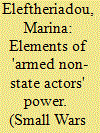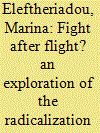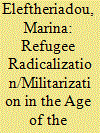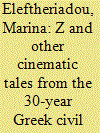|
|
|
Sort Order |
|
|
|
Items / Page
|
|
|
|
|
|
|
| Srl | Item |
| 1 |
ID:
131982


|
|
|
|
|
| Publication |
2014.
|
| Summary/Abstract |
Over the past few years there is an apparent re-regionalization of al-Qaeda activity, intensified by the ongoing Middle East turmoil. Its main characteristic is a trend towards the abandonment of focoist strategies and their replacement by more popular-based ones. This article aims at evaluating their capacity to implement such a strategy shift and sustain the required level of violence. As a means of evaluating this capacity, this article proposes the use of a DIME (diplomatic, informational, military, and economic) framework, which will hopefully provide an alternative angle of theorizing and understanding 'armed non-state actors' (ANSAs). The model is applied in the case of al-Qaeda in the Arabian Peninsula (AQAP), which appears to have effectively developed the military and informational dimensions, due partly to its own prowess and partly to the Yemeni state's weaknesses and the shortcomings of counterinsurgency. In contrast, the economic and diplomatic dimensions suffer from the lack of resources and the anti-systemic nature of AQAP.
|
|
|
|
|
|
|
|
|
|
|
|
|
|
|
|
| 2 |
ID:
173823


|
|
|
|
|
| Summary/Abstract |
Drawing on a survey of asylum seekers, the article provides a security assessment of the ‘refugee experience’ in Greece. This exploration of the ‘refugee situation’ on Europe’s eastern shore touches upon refugees’ prior and present grievances, the local and imported ‘radical milieu’ and (Greek) host state’s will and capacity to implement sustainable and effective policies. The paper demonstrates that, although Greece lacks a developed radical milieu that could facilitate radicalization, Greece’s policy of ‘uninvolved tolerance’ creates a vacuum that might be filled by radical groups in the future. Also, with the exception of minors’ education, Greece scores low in most socio-economic indicators that delineate the ‘refugee experience’. In this environment, scarce employment opportunities and dependence on external sources for life-sustainment interweave with institutionalization and negative coping mechanisms. These silent and largely hidden from the public eye processes might become the ingredients of future radicalization.
|
|
|
|
|
|
|
|
|
|
|
|
|
|
|
|
| 3 |
ID:
175747


|
|
|
|
|
| Summary/Abstract |
This article constitutes an effort to examine the prospect of long-term refugee radicalization, beyond the dominant “short-sighted” debate on the possibility of radical Islamist militants posing as refugees. The main argument of the article is that refugees are inherently different from second-generation economic migrants, on whom most radicalization models are based. The article proposes a composite model that enriches our understanding of radicalization drivers with insights from refugee militarization studies. The model demonstrates that not only do some radicalization drivers present different dynamics in refugee populations, but that there are also other important factors, such as refugees’ cause of flight or prior political organization, which are absent in traditional radicalization models. Moreover, the article highlights the importance of a host state’s will and capacity to address refugees’ needs and the influence of external actors in policy formulation, particularly in weak or struggling host states. One implication of this study is that early-stage policies largely predetermine future radicalization. Another implication is that the possibility of refugee radicalization is not the same for every refugee population and in every (European) country. Thus, the policies the European Union or specific states adopt should be tailored to the specific needs of each community and state.
|
|
|
|
|
|
|
|
|
|
|
|
|
|
|
|
| 4 |
ID:
142613


|
|
|
|
|
| Summary/Abstract |
Greek cinema has documented and debated the civil war and its repercussions under different angles, largely defined by censorship, the general political climate, and cinematic trends. This article, first, offers a retrospective that traces the evolution of Greek cinema's ‘takes’ on the civil war vis-à-vis the political changes. Second, it provides an in-depth analysis of Costas Gavras’s film Z, examining its relevance to Greece and how political conflict, in general, is cinematically depicted. The article argues that Z and Gavras’s cinema have been affected and have affected the Greek political situation. However, while Z has spearheaded an international cinematic genre (political thriller), it had minimal effect on the Greek cinema.
|
|
|
|
|
|
|
|
|
|
|
|
|
|
|
|
|
|
|
|
|